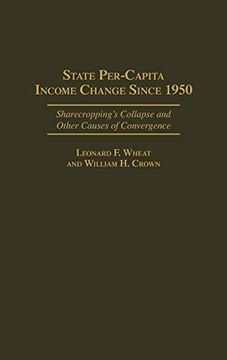State Per-Capita Income Change Since 1950: Sharecropping's Collapse and Other Causes of Convergence (in English)
Synopsis "State Per-Capita Income Change Since 1950: Sharecropping's Collapse and Other Causes of Convergence (in English)"
This book refutes prevailing theories that attribute post-1950 state per capita income convergence to (1) neo-classical adjustment mechanisms, (2) institutional sclerosis, and (3) southern industrialization. Wheat and Crown argue that southern income was low because of slavery's legacy-sharecropping, agricultural dependence, low urbanization, poor education, high Black population percentages, and low wage rates. The legacy's dominant feature was the sharecropper-tenant farmer system, which replaced slavery. Sharecropping was the foundation of southern poverty. Sharecropping's collapse, beginning around 1950, affected all of the other features of slavery's legacy. For example, millions of sharecroppers out-migrated from the South, shifting poverty to the North and lowering the South's Black percentage. This out-migration, white in-migration, and the civil rights movement jointly raised educational attainment in the South, further boosting southern income. Southern industrialization had only a marginally significant effect. In 1950's high income region, the West, the transport cost element in the price of manufactured goods shrank because of (1) transportation improvements and (2) rapid manufacturing growth, which reduced the need for long distance imports from the Manufacturing Belt. The resulting decline in the West's relative cost of living led to wage adjustments. Consequently, the West-despite having the highest manufacturing growth rates-had the nation's lowest per-capita income growth rates. Agricultural decline and educational gains stimulated income growth in the Plains. Nationally, per-capita employment gains were a strong influence.

